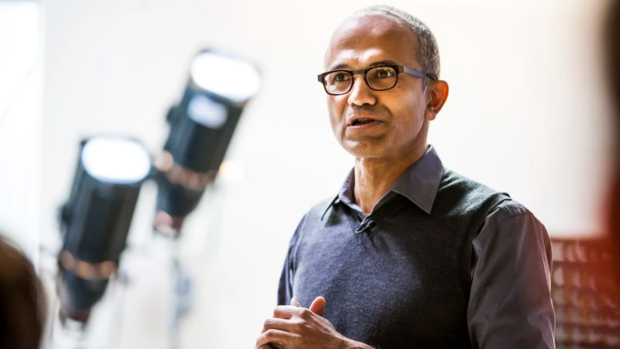
Google courtroom drama unmasks the battle for the next Web
Testifying this week at the US government’s trial of Google, which alleges that the company engages in anti-competitive business practices, Microsoft’s chief executive Satya Nadella (pictured) had a lot of interesting things to say.
The hearing comes after the launch last month of the US Department of Justice (DoJ) of its so-called ‘antitrust’ case (trust is a slightly archaic American term for conglomerate) seeking to prove that Google uses its status as the dominant Internet search engine to shut out rivals, and Microsoft agrees.
Microsoft, of course, is a company that knows a thing or two about antitrust cases, having been, in 2000, ordered to break-up the company (though this was overturned on appeal). Microsoft’s de facto monopoly on operating systems, productivity applications used in business, and, at the time, Web browsers, meant the company had an advantage over competitors and was cementing it by tying its browser, Internet Explorer, into the Windows operating system, the court found.
Now, however, Nadella claims that the shoe is on the other foot.
Among the issues raised so far in the case is the $10 billion (approx. €9.47 billion) bung that Google pays to Apple so that its search engine remains the default option in Apple’s Safari, which is widely used on iPhones and iPads. So valuable this position is reckoned to be that Microsoft was willing to give almost anything to Apple in order to dethrone Google Search, including not only all of the economic upside of the deal but also remove Microsoft’s branding entirely from search results.
Nadella also speculated that Apple pulled out of discussions with Microsoft as it may fear retaliation by Google if Apple devices switched their default to Bing. (David Pierce’s extensive report on Nadella’s testimony, published by US tech web site The Verge, is well worth the read).
The bottom line according to Microsoft is that, today, Google is the Web: “Everybody talks about the open Web, but there is really the Google Web,” Nadella said.
In a closed hearing, Gabriel Weinberg, chief executive of search minnow DuckDuckGo reportedly claimed he had been in discussions with Apple about his company’s search engine being the default provider when Safari was in private mode. A report by CNN quoted Weinberg as saying: “Our impression was that they were really serious,” which he said was calculated “would increase [DuckDuckGO’s market share] multiple times over”.
Obviously this is all about money. Nadella noted that Bing, even as an also ran in search, was already “marginally profitable”, and responded to the DoJ’s lawyer questioning him about why Microsoft wanted to compete with Google by saying: “I see search as the largest software category out there by far […] I used to think of Windows and Office as attractive businesses until I saw search.”
John Schmidtlein, Google’s lead lawyer said Microsoft had simply failed to win the search market, listing a long litany of the company’s failures from MSN Search to Windows Phone, to which Nadella responded with affirmative answers including “correct” and “sounds right”.
Nadella is the opposite of a disinterested party, of course, and his statements have to be read in light of his role running a company gunning for Google’s business. Nevertheless, they were interesting and surprisingly candid. Under cross examination by Schmidtlein, who noted Chrome was the most popular browser on Windows despite Microsoft’s Edge being installed by default, Nadella straightforwardly said “Google did a good job of innovating in the browser”.
One cheer for Microsoft, then. It is quite refreshing to hear anyone in the tech industry, let alone a chief executive, admit to being bested by the competition or having failed.
Public interest
Nadella’s claim that Microsoft wants to “make search more competitive [that is run like a] public utility” can be ignored: any non-dominant player in a sector would say that, and could be expected to say something different if they were in the lead.
Slightly more is going on here than search, though. The background to all of this, at least from Microsoft’s point of view, is artificial intelligence (AI).
AI, many believe, will not only assist in search, but actually replace it in many cases: after all, most Web searches come about when someone wants to know something, and this thing, whatever it is, could simply be told to them by an AI. Looked at this way, search is simply an artefact of the chaotic development of the early Web, where information had little to no structure.
Notably, Nadella backpedalled from his previous position of Microsoft having, through its partnership with OpenAI, trumped Google in the race to deploy AI. Now Nadella says Google could use AI to lock up traffic and, hence, revenue. Competing with Google might, he said, “become even harder in the AI age”.
CNBC reported Nadella speculating on this, saying he imagined “even worse of a nightmare to make progress in search because there’s a new avenue to lock up – the thing that basically feeds the power of these LLMs, which is content.”
For anyone interested in the role and impact of the Internet on society, or simply the machinations of the tech giants, all of this is fascinating stuff. Still, this battle of the two tech giants will leave many asking: can’t they both lose?





Subscribers 0
Fans 0
Followers 0
Followers